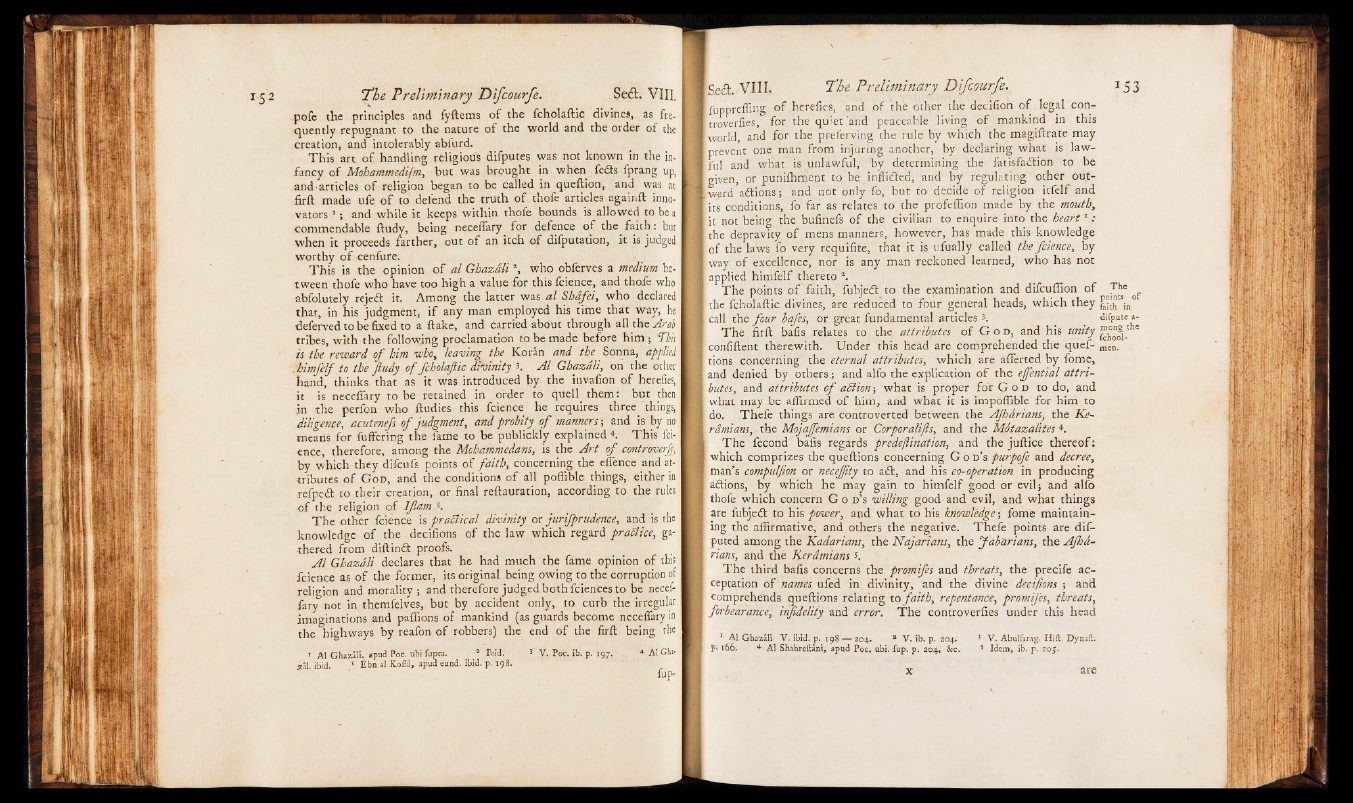
pofe the principles and fyftems of the fcholaftic divines, as frequently
repugnant to the nature of the world and the order of the
creation, and intolerably abfurd.
This art of handling religious difputes was not known in the in-
fancy of Mohammedifm, but was brought in when fedts fprang up,
and articles of religion began to be called in queftion, and was at
firft made ufe o f to defend the truth of thofe articles againft innovators
1 ; and while it keeps within thofe bounds is allowed to be a
commendable ftudy, being neceffary for defence of the faith: but
when it proceeds farther, out of an itch of difputation, it is judged
worthy of cenfure.
This is the opinion of al Ghazali *, who obferves a medium between
thofe who have too high a value for this fcience, and thofe who
abfolutely rejedt it. Among the latter was al Shdfei, who declared
that, in his judgment, if any man employed his time that way, he
•deferved to be fixed to a flake, and carried about through all the Arab
tribes, with the following proclamation to be made before him ; This
is the reward of him who, leaving the Koran and the Sonna, applied
.himfelf to the ftudy o f fcholaftic divinity 3. A l Ghazali, on the other
hand, thinks that as it was introduced by the invafion of herefies,
it is neceffary to be retained in order to quell them: but then
in the perfon who ftudies this fcience he requires three things,
diligence, acutenefs of judgment, and probity of manners; and is by no
means for fuffering the fame to be publickly explained * This fcience,
therefore, among the Mohammedans, is the Art of controverfpi
by which they difcufs points of faith, concerning the effence and attributes
of G od, and the conditions of all poffible things, either in
refpedt to their creation, or final reftauration, according to the rules
o f the religion of JJlam s.
The other fcience is praBical divinity or jurifprudence, and is the
knowledge of the decifions of the law which regard praBice, gathered
from diftindt proofs.
A l Ghazali declares that he had much the fame opinion of this
fcience as of the former, its original being owing to the corruption of
religion and morality ; and therefore judged both fciences to be neceffary
not in themfelves, but by accident only, to curb the irregular
imaginations and paffions of mankind (as guards become neceffary in
the highways by reafon of robbers) the end of the firft being the
i A1 Ghazali, apud Poc. ubi fapra. 1 Ibid. 1 y . Poc. ib. p. 197. ' 4 Al Ghiaal
ibid ' Ebn al Koffa, apud eund. ibid. p. 198.
fiipfupprefling
of herefies, • and of the other the decifion o f. legal con-
troverfies, for the quiet and peaceable living of mankind in this
world, and for the preferving the rule by which the magiftrate may
prevent one man from injuring another, by declaring what is lawful
and what is unlawful,- by determining the fatisfadtion to be
given, or punifhment to be inflicted, and by regulating other out-
yvftrd adtions; and not only fo, but to decide of religion itfelf and
its conditions, fo far as relates to the profeffion made by the mouth,
it not being the bufinefs of the civilian to enquire into the heart1 :
the depravity of mens manners, however, has made this knowledge
of the laws fo very requifite, that it is ufually called the fcience, by
way of excellence, nor is any man reckoned learned, who has not
applied himfelf thereto z.
The points of faith, fubjedt to the examination and difcuflion of The
the fcholaftic divines, are reduced to four general heads, which they ;n
call the four bafes, or great fundamental articles3. " difputea-
The firft bafis relates to the. attributes of G od, and his unity
confiftent therewith. Under this head are comprehended the quef- men.
tions concerning the eternal attributes, which are afferted by fome,
and denied by others.; and alfo the explication of the ejfential attributes,
and attributes o f aBion-, what is proper for G o d to do, and
what may be affirmed of him, and what it is impoffible for him to
do. Thefe things are controverted between the Afharians, the Ke-
rdmians,, the Mojaffemians or Corporalifts, and the Motaza/ites *.
The fecond bafis regards predejlination, and the juftice thereof:
which comprizes the queftions concerning G o d ’s purpofe and decree,
. man’s compulfion or necefftty to adt, and his co-operation in producing
adtions, by which he may gain to himfelf good or evil; and alfo
thofe which concern G o d ’ s willing good and evil, and what things
are fubjedf to his power, and what to his knowledge-, fome maintaining
the affirmative, and others the negative. Thefe points are disputed
among the Kadarians, the Najarians, the Jab'arians, the Afhd-
rians, and the lierdmians s.
The third bafis concerns the promifes and threats, the precife acceptation
of names ufed in divinity, and the divine decifions ; and
comprehends queftions relating to faith, repentance, promifes, threats,
forbearance, infidelity and error. The controverfies under this head
1 Al Ghazali. V. ibid. p. 198 — Z04. * V. ib. p. 204; 3 V. Abulfarag. Hill, Dynaft.
P*166. 4 Al Shahreftani, apud Poc, ubi. fup. p. 204, &c. * Idem, ib. p. 205.
X are